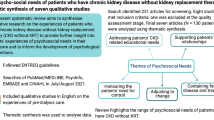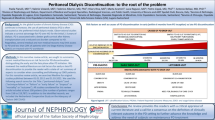Abstract
Objectives: Peritoneal dialysis requires mental and physical adjustments. The purpose of this chapter is to describe some of the psychosocial adaptations that patients and their families may make to adjust to a regimen of peritoneal dialysis (PD) at home.
Methods: Results from several PubMed searches were reviewed to identify relevant articles. Articles were chosen that included patient perspectives, described fundamental psychological patterns, or were novel and added to the existing literature.
Results: Recent emphasis on patient perspectives was present. Several studies detailed successful patient and caregiver coping strategies.
Conclusions. A growing body of evidence suggests that high-quality PD requires attention to the psychological and physical demands of completing PD treatments at home.
Access this chapter
Tax calculation will be finalised at checkout
Purchases are for personal use only
Similar content being viewed by others
References
Oliver M, Perl J, McQuillan R, et al. Quantifying the risk of insertion-related peritoneal dialysis catheter complications following laparoscopic placement: results from the North American PD Catheter Registry. Perit Dial Int. 2020;40(2):185–92.
Blake P. Drain pain, overfill, and how they are connected. Perit Dial Int. 2014;34:342–4.
Esagian SM, Sideris GA, Bishawi M, et al. Surgical versus percutaneous catheter placement for peritoneal dialysis: an updated systematic review and meta-analysis. J Nephrol. 2021;34(5):1681–96.
Sukul N, Zhao J, Fuller D, et al. Patient-reported advantages and disadvantages of peritoneal dialysis: results from the DOPPS. BMC Nephrol. 2019;20(1):116.
Oveyssi J, Manera KE, Baumgart A, et al. Patient and caregiver perspectives on burnout in peritoneal dialysis. Perit Dial Int. 2021;41(5):484–93.
Domenici A, Giuliani A. Automated peritoneal dialysis: patient perspectives and outcomes. Int J Nephrol Renovasc Dis. 2021;14:385–92.
Guney I, Solak Y, Atalay H, et al. Comparison of effects of automated peritoneal dialysis and continuous ambulatory peritoneal dialysis on health-related quality of life, sleep quality, and depression. Hemodial Int. 2010;14:515–22.
DeSilva I, Evangelidis N, Hanson CS, et al. Patient and caregiver perspectives on sleep in dialysis. J Sleep Res. 2021;30(4):e13221.
Oei E, Samad N, Visser A, et al. Use of continuous glucose monitoring in patients with diabetes on peritoneal dialysis: poor correlation with HbA1c and high incidence of hypoglycaemia. Diabet Med. 2016;33(9):e17–20.
Skubala A, Zywiec J, Zelobowska K, et al. Continuous glucose monitoring system in 72-hour glucose profile assessment in patients with end-stage renal disease on maintenance continuous ambulatory peritoneal. Med Sci Monit. 2010;16(2):CR75–83.
Salamon K, Woods J, Pau E, Huggins C. Peritoneal dialysis patients have higher prevalence of gastrointestinal symptoms than hemodialysis patients. J Ren Nutr. 2013;23(2):114–8.
Yi C, Wang X, Ye H, et al. Patient-reported gastrointestinal symptoms in patients with peritoneal dialysis: the prevalence, influence factors and association with quality of life. BMC Nephrol. 2022;23(1):99.
Duncanson E, Chur-Hansen A, Jesudason S. Psychosocial consequences of gastrointestinal symptoms and dietary changes in people receiving automated peritoneal dialysis. J Ren Care. 2019;45(1):41–50.
Brown EA, Zhao J, McCullough K, et al. Burden of kidney disease, health-related quality of life, and employment among patients receiving peritoneal dialysis and in-center hemodialysis: findings from the DOPPS program. Am J Kidney Dis. 2021;78(4):489–500.
Chan CT, Wallace E, Golper TA, et al. Exploring barriers and potential solutions in home dialysis: an NKF-KDOQI conference outcomes report. Am J Kidney Dis. 2019;73(3):363–71.
Duncanson E, Chur-Hansen A, Jesudason S. Patient perspectives of coping with automated peritoneal dialysis. Perit Dial Int. 2022;42:344–52.
Dimkovic N, Aggarwal V, Khan S, et al. Assisted peritoneal dialysis: what is it and who does it involve ? Adv Perit Dial. 2009;25:165–70.
Hussein WF, Bennett PN, Anwaar A, et al. Implementation of a staff-assisted peritoneal dialysis program in the United States. Clin J Am Soc Nephrol. 2022;17:703–5.
Ma X, Tao M, Hu Y, et al. Clinical outcomes, quality of life, and costs evaluation of peritoneal dialysis management models in Shanghai Songjiang District: a multicenter and prospective cohort study. Ren Fail. 2021;43(1):754–65.
Author information
Authors and Affiliations
Corresponding author
Editor information
Editors and Affiliations
Rights and permissions
Copyright information
© 2023 The Author(s), under exclusive license to Springer Nature Switzerland AG
About this chapter
Cite this chapter
Fissell, R.B. (2023). Peritoneal Dialysis: Psychosocial Adaptations and Burnout. In: Fadem, S.Z., Moura-Neto, J.A., Golper, T.A. (eds) Complications in Dialysis. Springer, Cham. https://doi.org/10.1007/978-3-031-44557-6_16
Download citation
DOI: https://doi.org/10.1007/978-3-031-44557-6_16
Published:
Publisher Name: Springer, Cham
Print ISBN: 978-3-031-44556-9
Online ISBN: 978-3-031-44557-6
eBook Packages: MedicineMedicine (R0)




